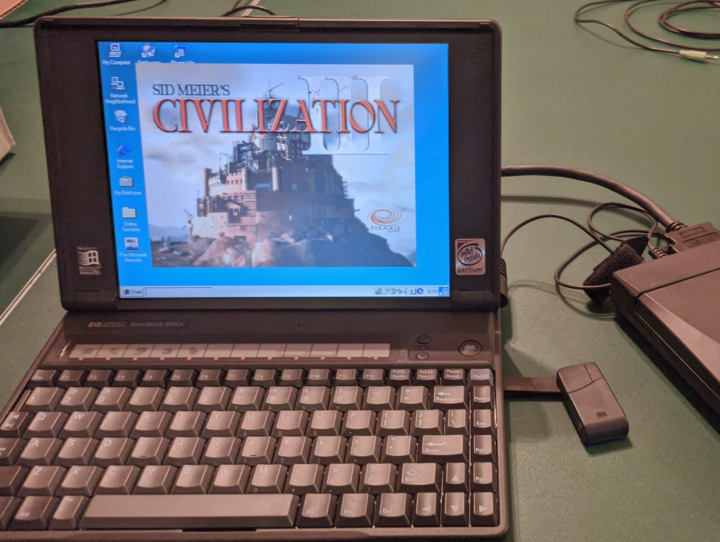
In the past couple of years, laptops have been released that I never thought would be possible. Whether it’s a foldable laptop like the ThinkPad X1 16 Gen 1, a fully modular gaming laptop like the Framework 16, or a laptop with a glasses-free 3D display, we’re in a golden era of design experimentation right now.
But there’s a long legacy of experimentation with laptop design, and as I looked back, I came across plenty of older machines from the 1990s and 2000s that are every bit as strange and conceptual.
HP OmniBook 800CT
First is a laptop that visually looked different from anything the world had seen in 1993, the HP OmniBook 800CT. This laptop, rather than shipping with a trackball or TrackPoint beneath the keyboard, comes with a unique pop-out mouse that you can eject from the side of the laptop.
You can press a button on the chassis to “eject” the mouse, and then pull out the ribbon cable to use it as you see fit. Everything else was pretty standard with this laptop, though, down to its Pentium CPU, the 800×600 resolution display, as well as the Windows 95 OS under the hood. It’s just the mouse that made it weird. YouTuber Retro Hack Shack gave the device a nice rundown in the video above.
IBM ThinkPad 701
IBM made the best laptops back in the olden days, but one of the weirdest ones back in 1995 was the ThinkPad 701C. This laptop featured a 4:3 aspect ratio screen, but more importantly, a fold-out keyboard. Every time you’d open the lid on the laptop, the mechanical keyboard would retract upwards, opening up like a butterfly’s wings. And, no, this isn’t the butterfly keyboard that Apple came up with in 2015 that plagued MacBooks. Rather, this keyboard sported a split design that hangs at the side of the laptop chassis when open, giving you room to type.
Unfortunately, though, the laptop didn’t last too long, as laptops with wider screens were more desired, so the concept no longer made sense. One modder, though, managed to put the Framework Laptop motherboard inside the IMB Thinkpad 701 and get the original keyboard working with a modern PC, so it does live on in one small way.
Lenovo ThinkPad W700ds
These days, you’re probably familiar with connecting your laptop to an external monitor or using a portable monitor for some productivity when you’re on the go. Before portable monitors were mainstream, though, Lenovo had its own solution for those who wanted to be productive on the go. Dubbed “the ultimate mobile workstation,” this 17-inch Windows laptop from 2009 featured Intel vPro and Core 2 Extreme processors under the hood.
But it is the display that matters. You could add an optional secondary display that you could “pull” from the side to have more screen space. Of course, the Lenovo ThinkPad W700sd laptop was pretty heavy and clunky, though, coming in at 11 pounds, so it’s no wonder why it wasn’t popular. Instead, Lenovo now has dual-screen laptops and laptops with a second screen built into the palm rest.
Asus Taichi
When Windows 8 first launched and the Microsoft Surface line was born, it became common to hear the phrase “turn your laptop into a tablet” since the 2-in-1 form factor became more prevalent. Asus, though, did things in its unique way. The Asus Taichi laptop wasn’t only a convertible where you could flip the screen around, but the back lid of the laptop was a second screen. Yes, that’s right. There are two screens on this laptop, one where you expect it and one where you don’t expect it.
Asus still has a website up for this laptop today, and it highlights how the second screen could be used separately to show a second window or even mirror what’s on the main screen. It all sounds pretty similar to dual-screen laptops like the Yoga Book 9i, so it’s nice to see the concept isn’t dead. You can see our original hands-on experience with the laptop from 2013 above.
Dell XPS M2010
The XPS lineup is known for pushing the envelope in design, but what if we tell you there was once a 20-inch XPS laptop? You heard that right. Back in 2006, Dell had one of the biggest laptops that the world has ever seen, at least in terms of screen size. When closed, the laptop looks like a large briefcase, complete with a handle attached to the chassis with leather straps.
You can even detach the full-size keyboard, which has a built-in trackpad for use when on the go. Even cooler? There’s a pop-up CD drive in the middle, 8 speakers in the front, and a subwoofer on the bottom for the ultimate movie experience. Heck, even the webcam on the top of the laptop’s display could swivel around. The device weighs in at 18.3 pounds, though, so it’s not quite a portable laptop as the XPS devices we know these days, but it’s still wicked cool, and the idea lives on.
Though it’s an all-in-one PC, HP recently launched the HP Envy Move, which takes some inspiration from the XPS M2010, like the big 23-inch display, the briefcase handle, and the portable keyboard that houses in the back.
There’s still a lot of wild laptops out there
Those were five of my favorite “weird” laptops, but the digger I went into things, the more I realized that there’s a lot more out there. Small 7-inch laptops like the Via NanoBook and the Asus ROG GX700, which was a laptop with a built-in liquid cooler, are just two examples. It makes me wonder, 20 or 30 years from now, what cool technology will be out that makes our modern laptops look vintage and “weird.”
Editors’ Recommendations




